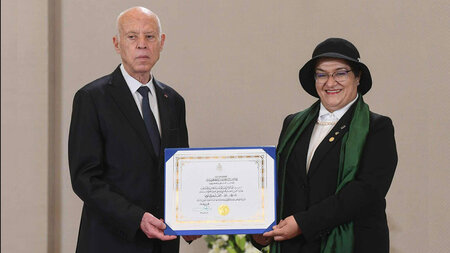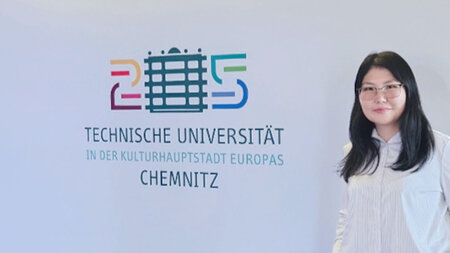Overview

Welcome to Master Micro and Nano Systems programme at Technische Universität Chemnitz. This English-language programme provides world-class, future-oriented education in design, manufacturing, characterization and integration of miniaturized components into engineering systems.
The interdisciplinary courses not only cover fundamental theoretical knowledge in physics and engineering but also application-oriented skills in developing innovative products, in business administration and management. Classes and practical training address current and prospective needs of industrial and academic research. Graduates are well-prepared to start an international career in a future-oriented branch of business.
The application portal in Uniassist opens at the beginning of May 2026.
| Course Flyer: |
Career opportunities
The possibilities for graduates are widespread, because of the high potential for innovation in nano and micro systems. The teaching language, English, offers degree holders excellent chances to become global actors, for example in the following areas:
- Automotive industry
- Semiconductor industry
- Chip and Sensor Industry
- Plant engineering
- Research and development at universities
- Employment at state-owned and private research facilities
Course structure
Compulsory subjects (obligatory)
- Microsystems design (semester 1, lect/sem/lab)
- Design of heterogeneous systems (semester 2, lect/sem/lab)
- Semiconductor physics/nano structures (semester 2, lect/sem)
- Micro and nano devices (semester 1, lect/sem/lab)
- Smart sensor systems (semester 1, lect/sem/lab)
- Reliability of micro- and nano systems (semester 1 & 2, lect/sem)
- Technologies for micro and nano systems (semester 1 & 2, lect/sem)
- Advanced integrated circuit technology (semester 2, lect/sem)
- Materials in micro and nanotechnologies (semester 1, lect/sem)
Elective subjects (optional)
Students have to elect and pass subjects of the following catalogue in order to earn 20 credits:
- Automotive sensor systems (semester 2, lect/sem) - 5cr
- Integrated circuit design - transistor level (semester 2, lect/sem/lab) - 5cr
- Fields and waves (semester 2, lect/sem) - 3cr
- Design for testability for circuits and systems (semester 1, lect/sem) - 2cr
- Power semiconductor devices (semester 3, lect/sem) - 5cr
- Microscopy and analysis on the nano scale (semester 2, lect/sem) - 5cr
- Optoelectronic devices (semester 3, lect) - 3cr
- Surfaces, thin films and interfaces (semester 3, lect/sem) - 3cr
- Micro optical systems (semester 2, lect/sem) - 3cr
- Self organising networks (semester 2, lect) - 2cr
- Network security (semester 2, lect) - 2cr
Research project (obligatory, at the university) - semester 3
Master's thesis (obligatory, at the university) - semester 4
Admission requirements for international students
| Academic: |
Bachelor’s degree in Elektrotechnik und Informationstechnik from Chemnitz University of Technology or an equivalent appropriate degree in the area of electrical engineering and information technology (equivalency will be assessed by the examination board) |
| English: | B2 or equivalent proof of English language proficiency |
| German: |
A1 for regular admission and enrolment. A2 until the end of the 3rd semester |
| Degree: | Master of Science (M.Sc.) |
| Start of course: |
generally in winter term (October) As a rule, first semester students begin their studies in the winter semester. With the approval of the examination board, enrolment is also possible for the summer semester, which can, however, lead to an extension of the study period beyond the standard study period. Furthermore, it is possible to apply for a higher semester, provided that sufficient credits have been earned and the semester classification applied for corresponds to the semester for which admission has been granted. Further information on the application process can be found on the website of the Student Services Office. |
| Application deadline: | 15th July (international students, Uni Assist) |
| Duration of study: | 4 semesters (2 years) |
| Total Credits: | 120 ECTS Points |
| Location: | Chemnitz, Germany |
|
The medium of instruction is English. The additional requirement for German language proficiency is caused by general regularities of the university. |
|
Application
| Application procedure for international students | International students have to apply though Uni Assist according to the instructions given by the related sites of uni-assist. |
| Application procedure for German students | German students are asked to use the university's online application portal and follow the instructions given by Studentenservice. |
| Central Course Guidance Service | Studierendenservice |
| Academic counseling | 
Sven Quinger
Academic advisor
|
Contact

-
Phone:+49 371 531-24055
-
Email:
-
Address:Reichenhainer Straße 70, 09126 Chemnitz
-
Room:C25.114 (prev. 2/W114)
Studien- und Prüfungsordnung
Study and exam regulations for the Master Micro and Nano Systems programme
FAQ
-
What is the pre-requisite knowledge expected in this course?
Students applying to this course are expected to have fundamental knowledge in the following areas: IC design, Analog electronics (Operational Amplifiers), Digital Logic.
-
Do I need to have German language skill to take part in this course?
Though the mode of teaching is in English for this course. German Level A1 Certificate is required for regular admission and enrolment and German Level A2 Certificate should be submitted by the end of 3rd semester.
-
Where can I find important dates during the semester for this program?
Details about important dates for the semester cyle can be found at this link .
-
Where can I find the time table for this program?
Time table for this program can be found at this link .
-
Where can I find details about the curriculum and exam regulations of this program?
Details about curriculum and exam regulations related to this program can be found at this < a href="https://www.tu-chemnitz.de/zpa/sopo/88/9C1.php" target="_blank">link .
-
Who can be the supervisor of the master thesis?
Advisor of the master thesis can be any professor from the department of Electrical Engineering and Information Technology ( link to the professorships ), but the professorship should be related to the topic of the thesis.
-
Is there any mandatory industry internship in the master course?
The master course itself includes enough practical components. Hence there is no mandatory industry internship included in the course.
-
What is the optimal duration of the studies?
The optimal duration of the studies is four semesters. It is important to maintain it, because it is not well accepted by research and industry to extend the study duration.
-
Is the master course research or industry oriented?
The master course includes fundamental and applied knowledge related to micro and nano systems. The graduates have possibilities to make a career both in research as well as in industry. For both, they need to fulfill the corresponding course requirements. For a research career, the results obtained during the studies should be significantly higher than the average generally reached.
-
What is the optimal date to come to Chemnitz?
The studies begin in October every year. The first week is dedicated to introduction to studies: "Orientation-Phase" which includes:
- Interesting information about study requirements, study environment, location of important offices, Buildings and library.
- Enrolment to the practicals is also carried out during the first week of the semester.
- During second week of the course professor from each chair introduces the topics, outlines and expectations of the specific courses.
-
How can I prepare my self to this course before coming to Chemnitz?
Please try to train programming skills and German language for day to day communication.





